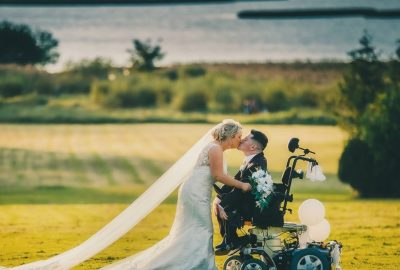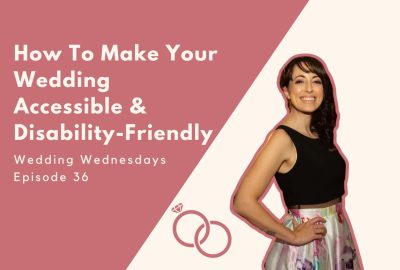There are so many things to think about when planning your wedding. Flowers, seating arrangements, getting invitations out on time, and even more. Something we don’t often talk about (but we really should) is just how accessible your wedding is. Did you know that 1 in 7 people in Ireland has a disability? With this in mind, there are a few really simple things you can do to host an accessible, disability-friendly wedding that’s inclusive! Hint: it’s more than just making sure you’ve got a ramp at the entrance and exit.
Featured image: Viliam Revtak from James and Ally’s Wedding
Ask your guests
Never ever make assumptions! Use your wedding RSVPs to give guests an opportunity to share with you if they have special needs. This will avoid awkward moments on the day or miscommunication. On your wedding invitations, when asking guests to RSVP, you could include a line like this: “We can’t wait to share our day with you! Please let us know if you have dietary requirements or special accommodations.”
In addition, if you know a guest has special needs, it doesn’t hurt to ask about them. Something like this: “We’re planning our wedding and we want to make sure it’s accessible to you. Could you please give us some ideas of what we need to look out for?”
Talk to your suppliers
Make sure your supplier team is aware of any disabilities that you or your guests have. Your suppliers don’t want anybody to feel like they need to fight through the pain or be uncomfortable. So let them know about any mobility limitations, energy levels or where you can and can’t go.
Check that your venue is accessible
When you visit your wedding venue, arm yourself with a list of things to look out for. If you’ve already visited and booked your venue, give your coordinator a call and ask these questions:
- Does the venue have a ramp for entering and exiting?
- Do the steps and staircases have accessible options? For example, could each guest have access to the balcony or garden?
- Do the doors and elevators have automatic door openers or a ‘push to open’ button?
- Are there working elevators and somebody available to fix an elevator issue should one arise?
- Are the bathroom stalls big enough for a wheelchair and are there grab bars?
- Do all guests have access to food, drinks and snacks? Think about the plated meal, buffet service and bar.
- Will everybody be able to enjoy their meal from their chair?
- Will the mic stands be adjustable for accommodate different heights of guests and their mobility?
- Let your venue coordinator know of any guide dogs or assistance animals expected. Your venue might not realise that they legally have to allow guide dogs (see here for more). You may request a bowl of water and owners can arrange food for the dog. The venue offering a treat for the dog is a lovely touch, but not expected.
Think about the disabilities we can’t always see
We know that not all disabilities are visible and some guests may have medical disabilities, visual impairments or be hard of hearing. Here are some suggestions to consider for your Big Day:
- If you are live-streaming your wedding, consider having closed captions for those hard of hearing.
- You might want to hire an interpreter for the speeches. If you do, make sure they are visible to the audience.
- Let guests know about the use of flash photography or bright and flashing lights.
- Consider using larger font on your invitations for visually impaired guests.
- Create a quiet space for guests to use when they need a break from socialising. This will help anybody who is overwhelmed.
Demystify the day
Some people get very anxious about going somewhere new. Use your wedding website to provide as much information about the venue and the plan for the day as you can! You could lay out the detailed schedule for the day, answer FAQs and provide other valuable information to help guests feel comfortable and confident about what to expect.



